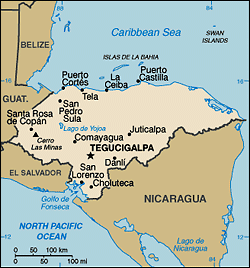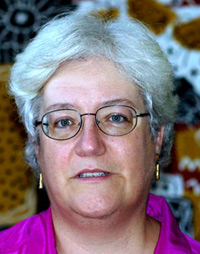Scholars protest repression of colleagues in Honduras
Berkeley anthropologist launches online petition and blog in the wake of president's ouster
| 25 August 2009
 Map
of Honduras
Map
of Honduras The Honduran military deposed that nation's elected president, Manuel Zelaya, on June 28, and has resisted international pressure to permit his return. Joyce, an anthropologist who has been conducting research in Honduras for more than three decades, says the de facto regime has also initiated a poorly publicized but systematic purging of intellectuals and artists.
According to Joyce, medical volunteers in Tegucigalpa, the capital, have reported injuries to hundreds of students and faculty in demonstrations at universities there. "Demonstrators killed," she says, "include a graduate of one of the two universities occupied by the army, usually described as a school teacher, but mourned in Honduras by the university community."
In their petition, U.S. scholars are protesting the "damage being done to institutions that create knowledge and education," says Joyce. "There's an international network of scholars and researchers, and we need to speak up for each other."
The petitioners urge the U.S. government to officially declare Zelaya's ouster as a coup — an action that would trigger legally mandated withholding of U.S. aid. "There's widespread belief in Latin America that if the United States took economic steps, the regime would fold," Joyce notes.
"Our national interest in Central America is ill-served by mixed messages that encourage authoritarian rule," the petition says. "With the repression practiced on university students, we see the next generation of potential leaders of Honduran civil society losing faith in the U.S. as a source of support, and we urge policy decisions to consider wider interests, not the narrow and short-term goals that appear to be dictating United States' inactivity."
 Anthropologist
Rosemary Joyce
Anthropologist
Rosemary Joyce Joyce began her research in Honduras during the 1970s, when the country was ruled by a military dictatorship, and has witnessed its hard-won transition to a constitutional democracy in the decades since. She says there is a narrow window of time "to fix the situation…. We really have until the end of August" — when the campaign for Honduras's Nov. 29 presidential and congressional elections gets under way. If the democratically elected government is not restored by the beginning of the campaign, she fears that the election process will be "tinged with illegitimacy."
The Berkeley anthropologist is troubled by the depth of young Hondurans' disillusionment with Washington — given its failure to vigorously oppose Zelaya's ouster — "and how open they are to the argument that the U.S. was actually behind the coup. This has lost the U.S. an enormous amount of credibility," she believes.
The online petition quickly garnered 100 signatures, then 150, as word spread via scholarly networks. It has been forwarded to President Obama, Secretary of State Hillary Clinton, Sen. John Kerry, and other members of Congress, with updates as additional scholars add their names. Berkeley signatories include professors Beatriz Manz (geography and ethnic studies), William Hanks (linguistics), and William Taylor (Latin American history, emeritus), along with a number of doctoral students, postdocs, and visiting researchers. (An updated list of signatures can be found with the original petition online.)
African ('Garifuna') roots in Honduras
Historian Russell Sheptak has been writing blog posts on the Honduran political crisis with his wife, Rosemary Joyce. Currently a visiting scholar at the campus's Archaeological Research Facility, Sheptak studies the history of the colonial period in Honduras. His research reveals the region's rich multicultural history, including the long-ignored and long-suppressed story of an African presence there.
Joyce says that the recently deposed government "had a strong policy of promoting pluralism and multiculturality," and that this policy, among other things, was threatening to the power elite. "It's amazing to see how dangerous history can be to a regime based on the idea of denying difference," she says. "Telling people where they came from turns out to be a dangerous thing."
Blog updates in English
Professor Joyce also launched a blog, "Honduras Coup 2009," the day after Zelaya's ouster. There, she and her husband, independent scholar Russell Sheptak, publish English-language translations of commentaries on the crisis by Honduran scholars and editorial writers, "to address the confusion encouraged by lack of basic knowledge about Honduras."
One point of contention is Zelaya's political orientation, since much of the U.S. press has characterized him as "leftist President Zelaya." To Joyce, that's equivalent to "calling John Edwards a leftist because he ran on the idea that a large number of people in this country weren't getting a fair shake." Rather, Zelaya is a centrist from a wealthy lumbering and cattle-raising family," she insists — albeit one who hopes "to alleviate his people's misery." Honduras is one of the poorest nations in the western hemisphere, she notes.
One recent post on the blog, dated Aug. 13, quotes a first-hand account from a member of a U.S. fact-finding delegation from the Quixote Center/Quest for Peace: "The army conducted an assault on the National University, and has turned it into a virtual military base. They arrested an undetermined number of people inside, some whose whereabouts are still unknown. Ambulances which left full of people who had been beaten, many reportedly with their faces battered, apparently never arrived at the hospital that was their supposed destination...."
When she first published her blog, the Berkeley anthropologist identified herself only with her initials, for fear of implicating and endangering "people I know and care about" in Honduras. But that calculation changed as violence escalated.
On Aug. 6, the rector of the National Autonomous University of Honduras, sociologist Julieta Castellanos, was thrown to the ground by police who were there to confront student demonstrators calling for the restoration of President Zelaya. The following day, Joyce and four other U.S. academics launched the "Petition Against Violence Directed at Universities and Research Centers in Honduras."

